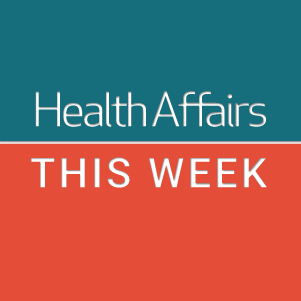[ad_1]
00;00;39;29 – 00;00;43;14
Leslie Erdelack
Hey, everyone. You’re listening to Health Affairs This Week. I’m Leslie Erdelack.
00;00;44;25 – 00;01;08;14
Jessica Bylander
And I’m Jessica Bylander. This is the weekly podcast where the editors at Health Affairs talk about the latest in health policy news and stories we’re following. Before we get started, we wanted to flag an upcoming event highlighting a new report coming out from the Health Affairs Council On Health Care Spending And Value. This council was charged with recommending ways that the U.S. can moderate health care spending growth while maximizing value.
00;01;09;09 – 00;01;37;08
Leslie Erdelack
That’s right. The council has been meeting since 2018, so this is a pretty big deal. It’s a culmination of their efforts and the event is on February 3rd. And now on to today’s topic, Jess. If you have health insurance, maybe this has happened to you or someone in your family, you move or switch to another insurer and you want to find a doctor or a mental health practitioner in your health plan’s network.
00;01;37;09 – 00;01;59;25
Leslie Erdelack
You might decide to shop around and consult your plans directory, expecting that information to be accurate so that you can make an informed decision about the health care options available to you, only to find out that the phone number for the practice is wrong or the provider moved and isn’t accepting new patients. Or maybe you find out that the provider isn’t even in your network.
00;02;00;12 – 00;02;28;01
Jessica Bylander
Yeah, you know, I have encountered this. Mostly, I’ve had situations where a provider listed in the directory, they actually maybe went out of business, or where, they’re listed, but aren’t actually accepting new patients. So health insurers are required to make these lists available to their members, but it doesn’t do much good if it isn’t up to date. Not only does it affect your ability to get care in a timely manner, but inaccurate provider directories also raise questions about whether the network is adequate as a whole.
00;02;28;01 – 00;02;55;24
Jessica Bylander
Are there really enough in-network providers and various specialties available to enrollees? Not to mention if you unknowingly go outside your network based on these erroneous listings in the directory, you might receive a higher and unexpected surprise bill from an out-of-network provider. There are now more protections in place against that through the No Surprises Act, by the way, which also created some new requirements for insurers to keep their provider directories up to date.
00;02;56;08 – 00;03;09;08
Jessica Bylander
So policymakers have been trying to tackle this longstanding issue of inaccurate provider directories for some time, but it’s been in the news again lately, and the Centers for Medicare and Medicaid Services (CMS) have been in the middle of it.
00;03;09;27 – 00;03;37;19
Leslie Erdelack
That’s right. There was a story in Modern Healthcare recently and a few other outlets have been covering some of the developments coming out of CMS related to provider directories and specific changes that the agency is considering for Medicare Advantage plans in an attempt to fix some of those challenges related to data availability and accuracy. So we will talk today about two recent proposals from CMS.
00;03;37;19 – 00;04;12;12
Leslie Erdelack
But before we get to those, I thought it was worth revisiting some of the ways that this issue directly impacts patient care when health plans don’t publish accurate information about the providers in their networks. And one of the practices that has been documented a lot in research that we’ve seen in Health Affairs is when plans list providers as members of a network when they actually aren’t accepting patients, creating these phantom networks, these ghost networks, where it looks like the provider-to-enrollee ratio is being met.
00;04;12;18 – 00;04;34;10
Leslie Erdelack
But in reality the supply of providers is much, much lower. And, you know, I’ve struggled to wrap my head around this, like, how does this happen? But these inflated numbers are based on the way that provider directories are erroneously capturing this information. And it’s a really big issue for access to mental health treatment in particular, right?
00;04;35;12 – 00;05;03;00
Jessica Bylander
That’s right. It is a particular issue for mental health care. I mean, we know from the research that mental health care is much more likely than general medical care to be delivered by an out-of-network provider, leading to a higher cost of care. And partly that’s because mental health professionals often don’t accept commercial insurance. But it’s also because of the situation you’re mentioning where directories list people who aren’t actually accepting patients or in-network.
00;05;03;10 – 00;05;23;15
Jessica Bylander
So back in 2020, we published a study that found that 44% of people were using a directory to try to find a mental health provider. And then more than half of those patients encountered directory inaccuracy. It might have just been, like, the phone number was wrong, but it also might have been in an accuracy of who was in-network versus out-of-network.
00;05;23;15 – 00;05;48;07
Jessica Bylander
And people who encountered inaccuracies were four times more likely to receive a surprise out-of-network bill. Then more recently, we had a study that looked at this issue in the Oregon Medicaid program. So they found that 58% of providers who were listed in Medicaid coordinated care organizations directories didn’t actually see Medicaid patients during the study period when they looked at the claims data.
00;05;49;03 – 00;06;19;09
Jessica Bylander
And that included more than 67% of mental health prescribers. So the authors refer to this phenomenon as a phantom network or a network where people are listed as providers but don’t actually see patients for a variety of reasons. And this is important because there are, quote/unquote, network adequacy requirements for some plans, including Medicare Advantage and ACA (Affordable Care Act) marketplace plans, and they vary for Medicaid by state.
00;06;19;09 – 00;06;39;11
Jessica Bylander
But basically network adequacy covers, you know, are there enough providers to meet the need or are there, you know, in the correct distances to members? So if there are providers on these directories who aren’t actually accepting patients, that can create a situation where maybe the network is following the letter of the law but not the spirit of the law.
00;06;39;12 – 00;06;46;17
Jessica Bylander
So, yeah, Leslie, as you mentioned, CMS is wading more deeply into this issue. So what’s the latest news?
00;06;47;05 – 00;07;14;03
Leslie Erdelack
Yes, so different federal and state agencies have put in place, you know, these regulatory requirements over the years to try to ease the burden on consumers. And I think CMS has been particularly involved in designing best practices for provider directories, including the data elements that these directories are required to have, things like up-to-date practice locations and whether the provider is accepting new patients.
00;07;14;29 – 00;07;39;20
Leslie Erdelack
So about a month ago, CMS came out with a proposed rule that would amend different parts of the Medicare Advantage program, and the rule includes some regulatory updates related to the information that provider directories are required to give. And a lot of these proposals are tied to broader policy efforts within the agency to promote health equity. And what does that look like?
00;07;39;21 – 00;08;13;00
Leslie Erdelack
Well, one of these proposed changes would involve requiring Medicare Advantage plans to include providers, cultural and linguistic capabilities in their provider directories, which would be beneficial, you know, particularly for non-English speakers and enrollees who use American Sign Language, for example. We were just talking about behavioral health. And so another important change in this proposed rule involves adding a completely new data element in the directories for providers who treat patients with medications for opioid use disorder.
00;08;13;10 – 00;08;38;16
Leslie Erdelack
And so this would allow someone to search the directory for a provider who has a special waiver, who has special training to administer these medications or prescribe them in an office setting. And then the other big change in this proposed rule would require all online provider directories to be fully searchable by every element by things like name, location, specialty.
00;08;38;26 – 00;09;02;15
Leslie Erdelack
And the current regulations don’t specify the elements that need to be searchable. And so kind of leaving that up to each health plan and, as you might expect, that really leads to a lot of fragmentation and differences in terms of how consumers are able to navigate this information. So the comment period on that rule is open until February 13th.
00;09;02;15 – 00;09;36;29
Leslie Erdelack
And again, the provisions related to provider directories are part of a much more expansive proposal related to policies that affect many different parts of Medicare Advantage. But we also know that late last year, Jess, CMS was in kind of the early stages of getting another initiative potentially off the ground. And this one has to do with aggregating all of the data in these provider directories to create one national health care directory and I think it sounds pretty ambitious and I’m curious what you make of this idea.
00;09;37;21 – 00;10;01;27
Jessica Bylander
Yeah, I mean, go big or go home, right? So I think that proposal is really interesting and I didn’t hear much about it at the time. So back in October of 2022, CMS released a request for information and it was seeking public input on the idea of creating this national directory of health care providers and services. Basically, in response to all the issues, kind of, we’ve mentioned during the episode today.
00;10;02;19 – 00;10;32;12
Jessica Bylander
They said the idea is to help people meet their needs and preferences and allow them to compare health plan networks. They also suggest this kind of network could spur electronic health data exchange. So CMS was wondering if having this centralized data hub led by the federal government for all health care directory and digital contact information, keeping it accurate, up-to-date and publicly available, would improve access to care and patient choice.
00;10;32;25 – 00;11;11;19
Jessica Bylander
And they also wondered whether having CMS lead this directory would reduce the burden on providers and payers to maintain their own provider directories. And comments were due back in early December and they received more than 600 public comments in response. And it was, you know, seemed like a range of positive and negative reactions from, you know, there was one note from a parent who said the directory, a directory like that would be essential for helping them care for their child with special health care needs, to others who are kind of questioning whether a national directory would be any less inaccurate and how they could ensure it would solve any of the problems currently today.
00;11;12;04 – 00;11;17;18
Jessica Bylander
So that leads us to some of the news stories you mentioned at the top of that episode. What was the gist of those?
00;11;18;14 – 00;11;54;28
Leslie Erdelack
The gist is that not everyone is convinced that this idea is going to work. So some groups have sort of expressed concerns. Groups like the American Hospital Association. They sent a letter to the CMS administrator last month asking the agency to refrain from moving forward. And one of their primary concerns is that it’s really unclear how the national directory would improve upon the existing data sets that have already, that are already out there, that already collect provider information.
00;11;55;06 – 00;12;33;06
Leslie Erdelack
So in other words, you know what they’re saying in the letter is how is this going to fit in with the other existing provider directories? And then importantly, how will patients know when to rely on the national directory versus the one provided by their health plan? Meanwhile, America’s Health Insurance Plans, another national association, was generally supportive of the concept, but they would like to see even more collaboration between private payers and the federal government, saying that a national directory that doesn’t also meet the needs of private payers is still a fragmented system.
00;12;33;12 – 00;12;52;29
Leslie Erdelack
So I think everyone seems to be in agreement that CMS is recognizing an important objective here in trying to help patients get accurate information about their health care providers. You know, it’s a good thing, but I think we have a long way to go before something like this becomes a reality.
00;12;53;23 – 00;13;09;13
Jessica Bylander
Yeah, that’s right. And I think that’s a great place to wrap up. I learned a lot today. Thanks, everyone for listening to another episode of Health Affairs This Week. If you like this episode, tell a friend, leave a review and subscribe wherever you listen to podcasts. Thanks, Leslie.
00;13;10;09 – 00;13;25;10
Leslie Erdelack
Thanks, Jess.
[ad_2]
Source link




